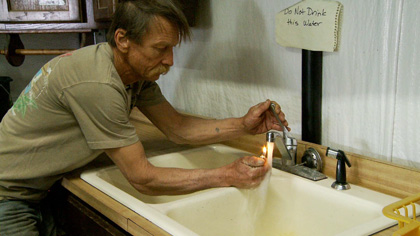Film review: Gasland

Improbably riveting, Josh Fox’s investigative doc about unregulated US hydraulic fracture mining is all the more powerful for its quiet meticulousness, says Sam Davies
A man stands by a sink, patiently holding a cigarette lighter to the mouth of a running tap. Nothing, more nothing, then boom – a fireball fills the air. The man reels back. “I smell hair,” he laughs in disbelief, looking at his singed arm.
It’s mundane yet surreal moments like this – tap water not just flammable but explosive – that make Gasland, a debut feature by its writer and director Josh Fox, arresting and at times terrifying. On the surface, a documentary about hydraulic fracture mining (‘fracking’) – the technology that pumps enormous quantities of water and toxic chemicals deep underground to extract natural gas from massive subterranean shale beds – hardly screams watchability. But, with a remorselessness all the more powerful for its quiet unfussiness, Fox builds up a riveting portrait of near-apocalyptic environmental damage and a corporate mindset willing to ruin water sources irrevocably for the sake of a few years’ profit.
Another example might be the ultraviolet image Fox is shown of a condensate tank, used to store by-products of the drilling. To the naked eye nothing is visible, but the UV shows clouds of toxic hydrocarbons billowing from the tank – examples of which Fox has previously been climbing over, oblivious to the danger. Gasland itself could be compared to this UV image: an attempt to make visible something invisible. Fox begins with the letter he receives offering him $100,000 for the rights to drill on his bucolic property in rural Pennsylvania. He visits Dimock, a small Pennsylvania town surrounded by fracking activity, and hears stories of wells exploding, black water, headaches, pains, long-term sickness. Fox goes on to tour 25 states, cataloguing similar stories and explaining the legislation pushed through by former vice president Dick Cheney, exempting energy companies from key environmental acts – exemptions that make fracking invisible to any regulation or monitoring.
Documentary investigations of corporate America’s abuses are still made in the shadow of Michael Moore and the doorstepping stunts that broke ground in reaching bigger audiences. Gasland humanises its unglamorous subject-matter by putting Fox and his road trip at the film’s heart. But the closest Gasland gets to Moore’s broadbrush symbolism comes when Fox dons a gasmask and plays a banjo to emulate 1960s protest singer Pete Seeger, while in the background fracking drills and condensate tanks fume hellishly. It’s a powerful, if theatrical, image – all the more so in a film otherwise defined by a cool meticulousness. Editor Matthew Sanchez is credited with the film’s ‘structure’, and his pacing is key to Gasland. While Fox narrates throughout in a deadpan murmur, the flow of images is at times allowed to build to a flood. Lists of deadly carcinogens, scans of leaked documents, the logos of ruthless but unregulated energy companies: all these pour from the screen like an uncapped well. The effect is to leave the viewer with the disturbing sense of the sheer quantity of evidence amassed by Fox, and what Gasland has had to omit.
See also
Muck and brass: Bill Morrison and Jóhann Jóhannsson talk to Nick Bradshaw about their archive remix project The Miners’ Hymns (July 2010)
Capitalism: A Love Story reviewed by Tony Rayns (March 2010)
Every doc for itself: Nick Bradshaw reports on the debate over campaigning documentaries at Sheffield Doc/Fest (November 2009)
Going underground: Lee Hall on the lost set of values revealed by the BFI National Archive’s treasure trove of films about the mining industry (October 2009)
Manufactered Landscapes reviewed by Mark Sinker (May 2008)
Our Daily Bread reviewed by Kieron Corless (February 2008)
Dear Wendy reviewed by Roger Clarke (August 2005)
Supersize Me reviewed by Leslie Felperin (October 2004)
Like Father reviewed by Richard Kelly (July 2001)
Prometheus reviewed by Glyn Maxwel (April 1999)


